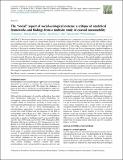Files in this item
The “social” aspect of social-ecological systems : a critique of analytical frameworks and findings from a multisite study of coastal sustainability
Item metadata
| dc.contributor.author | Stojanovic, Tim | |
| dc.contributor.author | McNae, Hilda | |
| dc.contributor.author | Tett, Paul | |
| dc.contributor.author | Potts, Tavis W. | |
| dc.contributor.author | Reis, J. | |
| dc.contributor.author | Smith, Hance D. | |
| dc.contributor.author | Dillingham, Ian | |
| dc.date.accessioned | 2016-08-19T11:30:15Z | |
| dc.date.available | 2016-08-19T11:30:15Z | |
| dc.date.issued | 2016-09-01 | |
| dc.identifier | 211006012 | |
| dc.identifier | 23f3ecfc-0dbe-497c-83c9-b6a7d210a228 | |
| dc.identifier | 84989204663 | |
| dc.identifier | 000385720400026 | |
| dc.identifier.citation | Stojanovic , T , McNae , H , Tett , P , Potts , T W , Reis , J , Smith , H D & Dillingham , I 2016 , ' The “social” aspect of social-ecological systems : a critique of analytical frameworks and findings from a multisite study of coastal sustainability ' , Ecology and Society , vol. 21 , no. 3 , 15 . https://doi.org/10.5751/ES-08633-210315 | en |
| dc.identifier.issn | 1708-3087 | |
| dc.identifier.other | ORCID: /0000-0002-8936-2299/work/64697650 | |
| dc.identifier.uri | https://hdl.handle.net/10023/9337 | |
| dc.description | The work described here was partly funded by the European Commission’s FP6 contract 036992. | en |
| dc.description.abstract | We evaluate whether society can adequately be conceptualized as a component of social-ecological systems, given social theory and the current outputs of systems-based research. A mounting critique from the social sciences posits that resilience theory has undertheorized social entities with the concept of social-ecological systems. We trace the way that use of the term has evolved, relating to social science theory. Scientometic and network analysis provide a wide range of empirical data about the origin, growth, and use of this term in academic literature. A content analysis of papers in Ecology and Society demonstrates a marked emphasis in research on institutions, economic incentives, land use, population, social networks, and social learning. These findings are supported by a review of systems science in 18 coastal assessments. This reveals that a systems-based conceptualization tends to limit the kinds of social science research favoring quantitative couplings of social and ecological components and downplaying interpretive traditions of social research. However, the concept of social-ecological systems remains relevant because of the central insights concerning the dynamic coupling between humans and the environment, and its salient critique about the need for multidisciplinary approaches to solve real world problems, drawing on heuristic devices. The findings of this study should lead to more circumspection about whether a systems approach warrants such claims to comprehensiveness. Further methodological advances are required for interdisciplinarity. Yet there is evidence that systems approaches remain highly productive and useful for considering certain social components such as land use and hybrid ecological networks. We clarify advantages and restrictions of utilizing such a concept, and propose a reformulation that supports engagement with wider traditions of research in the social sciences. | |
| dc.format.extent | 5103704 | |
| dc.language.iso | eng | |
| dc.relation.ispartof | Ecology and Society | en |
| dc.subject | Coastal | en |
| dc.subject | Scientometric analysis | en |
| dc.subject | Social-ecological | en |
| dc.subject | Social-ecological systems | en |
| dc.subject | Social science | en |
| dc.subject | Socio-ecological | en |
| dc.subject | GE Environmental Sciences | en |
| dc.subject | T-NDAS | en |
| dc.subject | BDC | en |
| dc.subject | R2C | en |
| dc.subject | SDG 15 - Life on Land | en |
| dc.subject.lcc | GE | en |
| dc.title | The “social” aspect of social-ecological systems : a critique of analytical frameworks and findings from a multisite study of coastal sustainability | en |
| dc.type | Journal article | en |
| dc.contributor.institution | University of St Andrews. Geography & Sustainable Development | en |
| dc.contributor.institution | University of St Andrews. Scottish Oceans Institute | en |
| dc.contributor.institution | University of St Andrews. St Andrews Sustainability Institute | en |
| dc.contributor.institution | University of St Andrews. Marine Alliance for Science & Technology Scotland | en |
| dc.contributor.institution | University of St Andrews. University of St Andrews | en |
| dc.identifier.doi | 10.5751/ES-08633-210315 | |
| dc.description.status | Peer reviewed | en |
| dc.date.embargoedUntil | 2016-09-01 |
This item appears in the following Collection(s)
Items in the St Andrews Research Repository are protected by copyright, with all rights reserved, unless otherwise indicated.

